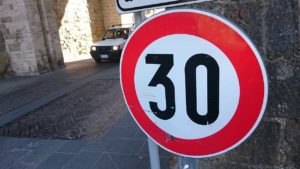A Qld lot owner is concerned about the need for speed limits on common property. Do the general road rules apply? How do we enforce breaches? Frank Higginson, Hynes Legal provides the following response.
Table of Contents:
- QUESTION: Are golf buggies required to be registered to drive on common property in a gated complex? Is it the responsibility of the committee to enforce this?
- QUESTION: Are speed limit signs mandatory on private roads within our strata scheme in Qld? How can we enforce and police speed limits and road safety?
Question: Are golf buggies required to be registered to drive on common property in a gated complex? Is it the responsibility of the committee to enforce this?
Answer: Are the roads are public or not?
It usually all comes down to whether the roads are public or not. If they are then the buggy needs to be conditionally registered to use them as per this from Main Roads: Conditional registration explained
If not, then it is about the regulation of the use of common property like the committee can do with respect to any form of transport.
Frank Higginson
Hynes Legal
E: [email protected]
P: 07 3193 0500
This post appears in Strata News #639.
Question: Are speed limit signs mandatory on private roads within our strata scheme in Qld? How can we enforce and police speed limits and road safety?
What are the requirements for road signage in community titles schemes and do the road traffic laws apply on private property as well as public roads?
For instance, are speed limit signs mandatory and what process should be followed in setting a speed limit?
We have under 20 lots with detached housing and no common building. Access is via a narrow single lane circuit road with a short cul-de-sac section.
Pedestrians need to walk on the road. A verbal request has been made to the Secretary of the committee asking for speed limit signs to be installed. This will hopefully improve road safety and ensure that residents and visitors are aware of acceptable speed.
The current Chairman of the committee regularly drives at excessive speed resulting in several instances of closes calls. One has been reported to Police.
Although speed limits may not solve the problem, it would at least set the benchmark for enforcement.
Also, it would seem logical that the Body Corporate has a duty of care to ensure safety on common property.
This brings about the issue of enforcement. How do we go about recording speeds and then enforcing the speed limits/breaches?
Your suggestions in this matter would be most appreciated.
Answer: Limits would be advisory only and not able to be strictly enforced.
 A body corporate can erect road usage signs (for example, displaying speed limits) on the common property, however, adjudicators have previously determined that any signposted speed limits would be advisory only and not able to be strictly enforced. In Canterbury & Westminster [2008] QBCCMCmr 234, the adjudicator relevantly reasoned:
A body corporate can erect road usage signs (for example, displaying speed limits) on the common property, however, adjudicators have previously determined that any signposted speed limits would be advisory only and not able to be strictly enforced. In Canterbury & Westminster [2008] QBCCMCmr 234, the adjudicator relevantly reasoned:
“I am of the view that any specific ‘speed limit’ which the Body Corporate may set would be advisory only and not able to be strictly enforced. However, if the speed or any other aspect of the manner of a person’s driving on common property was dangerous or otherwise could be shown to cause an unreasonable interference to the lawful use of the common property, that activity would amount to a breach of [the] Act.
However, the respondent, along with any other owners and occupiers should bear in mind that they should not drive cars on common property in such a way that interferes unreasonably with others’ use or enjoyment of common property or represents a nuisance or hazard.”
Where the body corporate has obtained a health and safety report that recommends a speed limit be enforced, it may be reasonable to include a speed limit in the by-laws. In those circumstances, a speed limit would be an enforceable by-law.
From a practical perspective though, there are evidential issues in proving someone is driving above a speed limit without a radar gun. In Prosperity Drive [2011] QBCCMCmr 518, the body corporate proved that an owner was speeding by timing the owner on three separate occasions over a known distance with a stopwatch and taking an average reading of the owner’s speed. This was further corroborated with a number of high calibre of witness statements, one by a former police officer, and a former member of the NSW highway patrol.
Regardless of there being any speed limit imposed in the scheme if the speed or any other aspect of the manner of a person’s driving on common property was causing a hazard or otherwise could be shown to cause an unreasonable interference to the lawful use of the common property, that activity would amount to a breach of section 167 of the Body Corporate and Community Management Act 1997. The best way to prove such a contravention would be with a video recording or credible witness statements.
Aside from dealing with dangerous driving behaviour through body corporate legislation, the body corporate may also look at installing speed bumps to encourage owners to comply with any signposted speed limit.
Frank Higginson
Hynes Legal
E: [email protected]
P: 07 3193 0500
This post appears in Strata News #239.
How do you manage speed limits in your strata scheme? Have a question or something to add to the article? Leave a comment below.
Read Next:
- QLD: The golden rules of by-law enforcement
- QLD: Q&A What about good old body corp community?
- Do Road Rules Apply Inside Gated Communities?
Visit our Maintenance and Common Property OR FactSheets: Strata Legislation QLD
Looking for strata information concerning your state? For state-specific strata information, take a look here.
After a free PDF of this article? Log into your existing LookUpStrata Account to download the printable file. Not a member? Simple – join for free on our Registration page.




I live in a complex in FNQ which unfortunately no longer has a gate or boomgate however traffic using the (private) road as a short-cut to a Street off our road are constantly speeding through at a speed far above the maximum of 20kph. Pedistrians including children use the road and at times unaccompanied by adults. The road has speed humps which it would seem have no affect, particularly as many of the vehicles seem to be large 4wd’s. I would, as a concerned resident, appreciate any feedback you could offer. Could police be involved in traffic control in this instance.
Thank you in advance
Ms Lee Avenir
This response from Chris Irons, Hynes Legal:
Thanks for your comment Lee. You can certainly get the police involved if there is a threat to someone’s safety. I’m not sure if they would have the relevant enforcement powers, but there is no harm in asking.
You say there is no longer a gate or boomgate. I presume that means there once was and this problem didn’t occur then? If so then it maybe time to think about getting one or both of those things reinstalled. If you’re an owner you can propose motions for the body corporate to consider at a general meeting and you can obtain quotes for that work. If you think money is going to be an issue for the body corporate, then that is understandable, but perhaps it would be good for other owners to think about the alternative of someone getting injured – or worse – if those things were not in place. No harm in you making that point to other owners.
It may pay to read the development approval given by council. In a scheme that I lived in on the Gold Coast the council specified maximum speed limits for certain roads in that development. What happens if they are breached – I do not know.